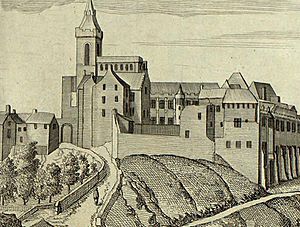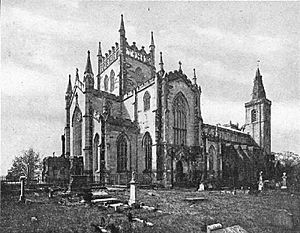Abbot of Dunfermline facts for kids
The Prior, then Abbot, and later Commendator of Dunfermline were the main leaders of Dunfermline Abbey in Fife, Scotland. This abbey was a special home for Benedictine monks. These monks were part of a religious order.
The abbey was officially started in 1128 by King David I of Scotland. But its history goes back even further! King Malcolm III had already set up a church there with help from Benedictine monks from Canterbury. Monks were sent to Dunfermline during the time of King Edgar (1097–1107). Anselm, a very important church leader, even sent a letter asking King Alexander I (1107–1124) to protect these monks.
By 1120, a leader named Peter was the Prior of the Dunfermline monks. He even led a group to Canterbury. In the 1500s, the abbey's control changed. Instead of being led by an Abbot, it was led by a "Commendator." This meant the leader was not always a monk. After James Stewart took over in 1500, commendators ran the abbey. By the late 1500s, the abbey's lands were divided up. Finally, in July 1593, the abbey was officially taken over by the Scottish Crown.
Contents
Leaders of Dunfermline Abbey
Dunfermline Abbey had different types of leaders over the centuries. First, there were Priors, then Abbots, and finally Commendators.
Priors of Dunfermline
A Prior was an early leader of a monastic community, often before it became a full abbey.
- Peter, 1120
- Richard Mongal, 1133–1148
Abbots of Dunfermline
An Abbot was the head of a large monastery or abbey. They had significant religious and administrative power.
- Geoffrey I, 1148–1154
- Geoffrey II, 1154–1178
- Archibald, 1178–1198
- Robert de Berwick, 1198–1202
- Patrick, 1202–1217 or 1223
- William I, 1223
- William II, 1223 or 1226–1238
- Geoffrey III, 1238–1240
- Robert de Keldeleth, 1240–1252
- John, 1252–1256
- Matthew, 1256
- Simon, 1267–1275
- Radulf de Greenlaw, 1275–1296
- Hugh, 1304 or 1306–1313
- Robert de Crail, 1314–1328
- Alexander Ber, around 1328-1329 to 1350 or 1351
- John Black, 1351
- John de Stramiglot, 1351–1383 or 1388
- William de Angus, 1383
- John de Torry, 1388–1409
- William de St Andrews (Anderston), 1413–1426
- Robert de Scotland, 1418–1419
- William Brown, 1427
- Andrew de Kirkcaldy, 1427–1444
- Richard de Bothwell, 1444–1468
- Alexander Thomson, around 1470
- Henry Crichton, 1471–1482
- Adam Cant, 1483–1490
- George Crichton, 1490–1500
- Some people tried to become Abbot at the same time:
- Raphael Riario, 1491–1492
- Robert Swinton, 1492
- Thomas Cranston, 1492
- Andrew Pictoris, 1492
- Some people tried to become Abbot at the same time:
Commendators of Dunfermline
A Commendator was a person, often not a monk, who was given control over an abbey's income and lands. This was common in later periods.
- James Stewart, 1500–1504
- Gilbert Strachan, 1504
- James Beaton, 1504–1509
- Alexander Stewart, 1509–1513
- James Hepburn, 1513–1516
- Peter de Accoltis, 1514
- Andrew Forman, 1514–1521
- James Beaton (again), 1522–1539
- George Durie, 1526 or 1539–1572
- Robert Pitcairn, 1553 or 1572–1584
- Henry Pitcairn, 1582 or 1584–1593
- Other people who had some claim or involvement:
- Patrick, Master of Gray, 1585–1587
- George, Earl of Huntly, 1587
- Other people who had some claim or involvement:
 | Laphonza Butler |
 | Daisy Bates |
 | Elizabeth Piper Ensley |



